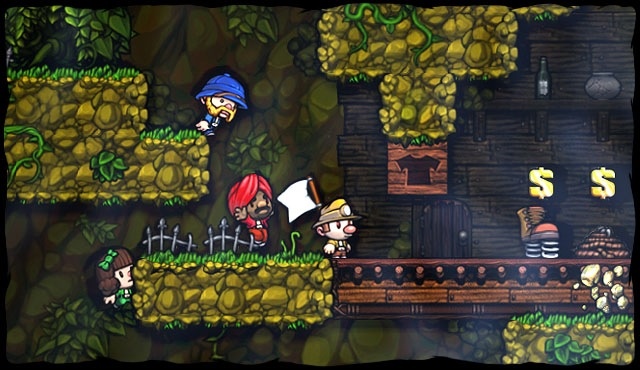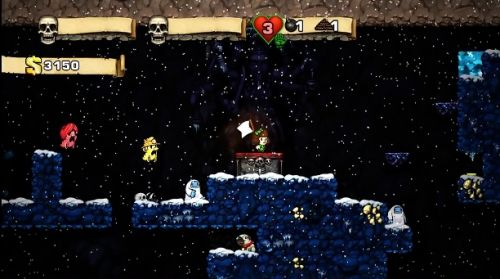
If you're incapable of turning those mistakes into lessons, you'd best run far away from the "mentally difficult" experiences. Defeating a hard game as a whole isn't the sole element that tickles our pleasure gland. Epiphanies abound during challenging opportunities. You know, those "ah-HA!" moments when the realization of what you've been doing wrong dawns and the path forward is clear. Successfully wrapping your mind around a puzzle in Portal, or downing a particularly troublesome boss in Dark Souls grants that empowering jolt many of us crave. Using knowledge to our advantage is the exact reason we've got those big fat brains. We might as well put them to use.
Spelunky tests the human mental capacity (and the boundaries of friendship) as well as any game could. It probably could have been titled Trial and Error in Caves: The Game. With tight controls and a cutesy, innocuous look, Spelunky keeps pulling back layers until one realizes they aren't looking at a difficult platformer at all. It's a puzzle game, stacking lessons upon lessons and forcing you to juggle all new information at once.
We toss around the term "Rogue Like" a lot these days, and Spelunky is more Rogue-ish in practice than most. You and your friends descend deeper and deeper into the caves, dodging increasingly nefarious enemies and learning from any sudden and explosive deaths you might endure. Lose your life, head back to square one. Putting your heads together (and giving you more than one life to play with) might see you further in the caverns than you'd reach by yourself, but your cooperative play might turn into a PVP experience with a single misplaced whip strike. Your friend meant to hit the bat, but instead lashed your intrepid explorer straight into a cluster of spikes where your lifeless body now lies. Hilarious? Yes, but also infuriating.

The magic of Spelunky not only lies in the difficult (but, exceptionally fair) gameplay, but also gratification upon reaching the end without having killed each other a trillion times. The co-operative gameplay not only requires an extensive knowledge of the game, but also trust in your partners as well. Relaying motives and strategies, working together as a team, and using your resources effectively are elements of working in harmony with your fellow players. It's a testament not just to your skill at Spelunky, but also your abilities to work outside the realm of the game in dealing with the human factor as well.
One of the strongest pulls in the medium for me is the human element. Experiencing new things with my pals, all of us progressing in skill at the current game we're all playing, keeps things interesting. Would it be nearly as much fun to play with friends if they didn't need to be there? If the games were nothing more than passive endeavors, requiring little in the way of skill or attention? Of course not. Your brain needs something to latch onto. It craves improvements and challenges, urging you to push forward and try something new. It's human nature that has brought us this far.
Games are no longer required to be difficult for the sake of being difficult alone. We don't need to offer a monetary sacrifice every time we lose all our lives, and games are (mostly) beyond imbuing themselves with near impossible challenges just to pad their lengths. Challenging games are coming back after too long of being away. After all, many designers grew up on those ridiculously difficult experiences. And while I might regret this later, I've only got one thing to say to those noble souls:
Bring it on.